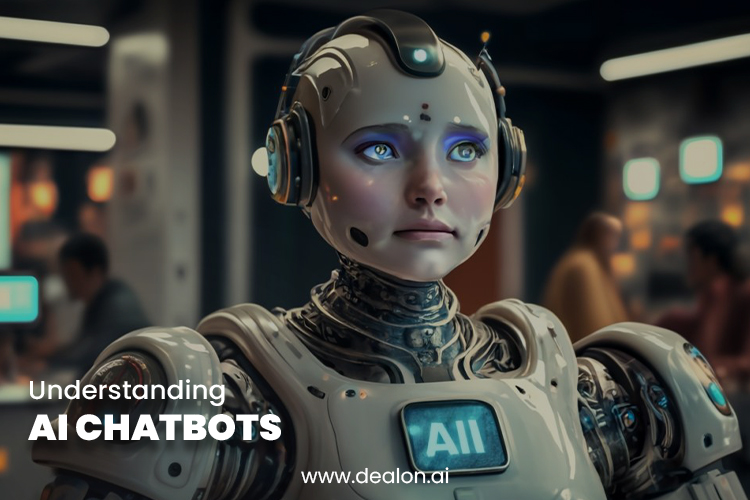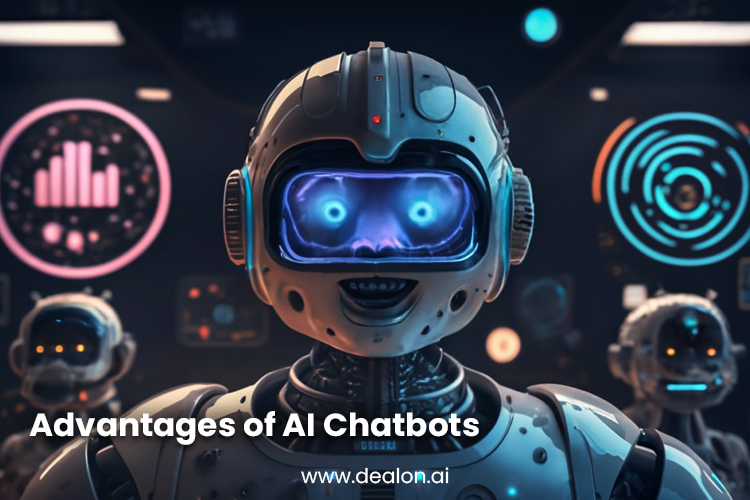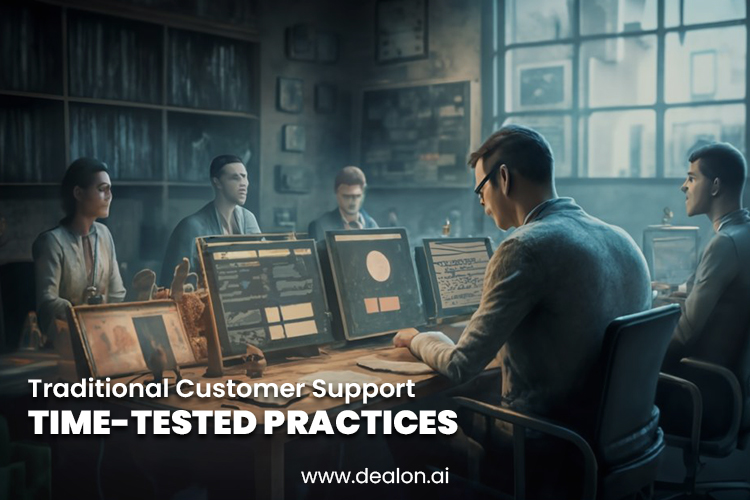Understanding AI Chatbots

AI or artificial intelligence-driven chatbots stand at the forefront of cutting-edge customer engagement technology. These intelligent virtual assistants harness the power of advanced algorithms, enabling them to engage users in natural language conversations. Specifically designed to simulate human-like interactions, these AI chatbots offer users a seamless and efficient interface to seek information, resolve queries, or access services effortlessly.
Utilizing artificial intelligence (AI), businesses can elevate their customer support capabilities, delivering an enriched experience to users. This implementation enables a responsive and intuitive platform that dynamically adapts to real-time user needs. By harnessing the power of AI, businesses not only streamline their customer support processes but cultivate an environment where user interactions are seamlessly accommodated.
Integrating AI-driven systems empowers businesses to offer timely and personalized solutions, increasing user satisfaction. This strategic utilization of AI technology underscores an obligation to stay at the forefront of customer service innovation, where adaptability and responsiveness converge to meet the evolving expectations of today’s dynamic consumer landscape. As the demand for instant and personalized interactions grows, AI chatbots emerge as indispensable tools in revolutionizing the landscape of customer engagement.
Advantages of AI Chatbots

24/7 Availability
AI chatbots stand out with unparalleled availability, a cornerstone of their appeal. Unlike human agents adhering to specific work hours, AI chatbots tirelessly operate around the clock. This ensures customers receive assistance anytime, transcending time zones and business hours. The continuous availability of AI chatbots is a game-changer, providing instant support precisely when customers need it the most, fostering a sense of reliability and satisfaction.
Rapid Response
The hallmark of AI chatbots lies in their ability to deliver instantaneous replies, setting them apart in customer support. This rapid response time is not merely a luxury but a strategic advantage. Customers, accustomed to swift interactions, appreciate the efficiency and immediacy of AI chatbots. The prompt resolution of queries contributes significantly to heightened customer satisfaction, crafting a positive overall experience and fortifying the brand-customer relationship.
Cost-Efficiency
Automating routine tasks is a key feature, making AI chatbots an attractive proposition for businesses seeking cost-effective solutions. By handling repetitive inquiries and functions, these virtual assistants reduce the dependency on a large customer support team. The result is a substantial decrease in operational costs, a pivotal factor in today’s competitive business landscape. The cost-efficiency of AI chatbots offers a compelling incentive for businesses looking to streamline operations and optimize resource allocation.
Strategic Integration
Businesses recognize the transformative potential of AI chatbots and strategically integrate them into their customer support arsenal. The continuous availability aligns with the modern consumer’s demands, while the rapid response time addresses the need for instant solutions. Moreover, the cost-efficiency complements operational strategies, enabling businesses to allocate resources judiciously. As AI chatbots become integral to the customer support strategy, they contribute to efficiency, overall brand perception, and customer loyalty.
Challenges of AI Chatbots
Lack of Emotional Intelligence
Despite technological prowess, AI chatbots need help understanding and appropriately responding to emotionally charged situations. The intricate tapestry of human emotions proves challenging for these virtual assistants, potentially resulting in responses that lack the nuanced understanding necessary to navigate sensitive interactions effectively. The absence of genuine emotional intelligence remains a notable limitation, especially in scenarios where empathy and human connection play pivotal roles in customer interactions.
Initial Setup Complexity
Implementing AI chatbots demands specific technical expertise, presenting businesses with a notable challenge. The initial setup involves a comprehensive process, including programming the chatbot to comprehend specific queries, seamlessly integrate with existing systems, and continually learn from user interactions. This technical complexity is a potential barrier for businesses considering the adoption of AI chatbots, as it necessitates a concerted effort and resources to ensure a successful and practical integration.
Strategic Considerations
Despite these challenges, businesses are drawn to AI chatbots’ undeniable advantages. The 24/7 availability aligns with the contemporary demand for instant and round-the-clock support, catering to a diverse global customer base. Rapid response times contribute to heightened customer satisfaction and positive brand perception. Cost efficiency further solidifies the strategic appeal of AI chatbots, allowing businesses to optimize resources and streamline customer support operations.
Continuous Improvement
Acknowledging the limitations, the future of AI chatbots lies in continuous improvement and evolution. Addressing the lack of emotional intelligence requires ongoing research and development efforts to instill a deeper understanding of human emotions. Improvements in natural language processing will play a foremost role in improving the conversational abilities of AI chatbots. This progress aims to enable them to navigate complex and emotionally charged scenarios with more remarkable finesse, enhancing their overall effectiveness.
User Education and Transparency
Overcoming the initial setup complexity involves technological solutions and user education. Businesses must invest in educating their teams about the capabilities and limitations of AI chatbots. Transparent communication with users about the automated nature of interactions can manage expectations and foster trust. As businesses navigate the challenges, user education becomes crucial to ensuring a seamless integration that aligns with customer expectations.
Hence, while AI chatbots present challenges, their undeniable benefits make them valuable in modern customer support strategies. As businesses navigate the delicate balance between the advantages and challenges, strategic considerations, continuous improvement, and user education emerge as critical pillars in harnessing the full potential of AI chatbots. The evolving landscape of technology promises advancements that may propel AI chatbots toward even more effective and emotionally intelligent solutions.
Also Read: Mastering Sales As A Team
Traditional Customer Support: Time-Tested Practices

Human Touch in Customer Interaction
In traditional customer support, the cornerstone is the human touch brought by skilled agents. These human agents serve as the face and voice of the company, embodying empathy and emotional intelligence in every interaction. Unlike automated systems, they can connect with customers personally, understanding the technical aspects of an inquiry and the underlying emotions. This personal touch fosters a genuine connection and understanding, creating a customer experience beyond mere issue resolution.
Empathy and Emotional Intelligence
Armed with empathy and emotional intelligence, human agents navigate the intricacies of customer interactions with finesse. They can discern and respond to customers’ nuanced emotions, whether frustration, satisfaction, or confusion. This empathetic approach establishes a rapport that transcends the transactional nature of customer support, engendering trust and loyalty. Customers appreciate the human touch, acknowledging their feelings and concerns and reinforcing the human-agent relationship as a fundamental pillar of adequate customer support.
Building Lasting Connections
The human touch in traditional customer support is instrumental in building lasting connections. By their interpersonal skills, human agents can turn a routine support interaction into a positive and memorable experience for the customer. This emotional resonance contributes significantly to brand loyalty and positive word-of-mouth, as customers remember not just the resolution of their issues but how they felt throughout the support journey. This enduring connection sets traditional customer support apart and makes it a time-tested practice in the ever-evolving customer service landscape.
So, the human touch in traditional customer support is synonymous with empathy, emotional intelligence, and the ability to build lasting connections. While technology continues to advance, the intrinsic value of human agents in understanding and responding to the nuanced needs of customers remains unparalleled. The personal touch they bring to interactions is not just a practice; it’s a legacy that continues to shape positive customer experiences and fortify the foundation of practical customer support.
Challenges of Traditional Customer Support
A prominent challenge in traditional customer support is the limited availability of human agents. Operating within defined work hours, human agents may not provide 24/7 support, causing potential delays in issue resolution. Customers, accustomed to instant responses, may experience frustration during non-operational hours. Balancing work shifts to cover different time zones adds complexity, highlighting the challenge of aligning human availability with the dynamic expectations of a global customer base.
The cost and scalability challenges form another significant hurdle. Hiring and training human agents demand considerable financial investment. As businesses grow and customer bases expand, the need for additional support staff intensifies, escalating costs. Striking the right balance between maintaining quality support and managing financial implications becomes delicate. This challenge is particularly pronounced for startups and smaller enterprises aiming to provide robust customer support while operating within budget constraints. Achieving scalability without compromising service quality poses an ongoing challenge in traditional customer support.
Also Read: Game Marketing And The Holistic Approach: A Perfect Match In 2023
A Comparative Analysis: AI Chatbots vs. Traditional Customer Support
Speed and Efficiency
AI chatbots, the champions of instant response, redefine the speed and efficiency paradigm. With the ability to provide immediate answers, they ensure swift query resolution. In contrast, traditional customer support, though effective, contend with potential delays stemming from factors like agent availability and workload. The immediacy of AI chatbots becomes a strategic advantage, especially in industries where rapid responses significantly impact customer satisfaction and overall user experience.
Cost-Effectiveness
The cost-effectiveness of AI chatbots stands as a notable differentiator. By automating routine tasks, these virtual assistants substantially reduce the need for an extensive human support team. The traditional approach, reliant on human resources, may incur higher costs associated with hiring, training, and maintaining a more extensive staff. AI chatbots offer an attractive proposition for businesses seeking to optimize operational costs while maintaining efficient customer support, making them a compelling choice in the cost-conscious modern business landscape.
Personalization and Emotional Connection
Traditional customer support holds a distinctive advantage in personalization and emotional connection. Human agents, equipped with empathy, excel in understanding and responding to customers’ emotional needs. This personalized touch fosters a connection that extends beyond the transactional. While AI chatbots are making strides in this domain, they may still grapple with replicating the nuanced understanding and emotional intelligence of human interactions. Striking a balance between technological efficiency and the irreplaceable human touch remains critical for businesses aiming to provide unparalleled customer experiences.
Continuous Technological Advancements
The comparison between AI chatbots and traditional customer support is dynamic, with both sides continuously evolving. AI chatbots, leveraging advancements in natural language processing and machine learning, are refining their ability to understand and respond to user emotions. The personalization and emotional connection gap between AI and human-driven support may narrow as technology progresses. This ongoing innovation ensures businesses stay attentive to emerging capabilities and possibilities, permitting them to make informed decisions based on the most delinquent developments.
Adapting to Industry Needs
The choice between AI chatbots and traditional customer support is not one-size-fits-all. Industries strongly emphasizing personalized, emotionally driven interactions may lean towards conventional methods. Conversely, sectors, where speed, scalability, and cost-efficiency are paramount, might find AI chatbots more aligned with their objectives. A nuanced understanding of industry-specific requirements becomes crucial, guiding businesses to adopt a customer support strategy that resonates with their unique operational demands and customer expectations.
Hybrid Approaches
The future of customer support may likely witness a harmonious coexistence of AI chatbots and traditional methods. Businesses can investigate hybrid strategies, combining the effectiveness of AI chatbots with the personalized approach of human agents. This synergistic strategy aims to capitalize on the strengths of both approaches, offering customers the best of both worlds. Achieving the appropriate equilibrium between automation and human interaction is a strategic necessity, ensuring a holistic and adaptive approach to evolving customer support dynamics.
The comparative analysis between AI chatbots and traditional customer support unveils a multifaceted landscape where each approach brings distinct advantages and challenges as businesses navigate this terrain: speed, efficiency, cost-effectiveness, personalization, and industry-specific needs guide decision-making. Whether embracing the innovation of AI or cherishing the human touch, the ultimate goal is to deliver exceptional customer experiences that resonate with the unique characteristics of each business and industry.
AI chatbots shine in speed, efficiency, and cost-effectiveness, revolutionizing customer interactions. However, the irreplaceable human touch of traditional customer support, marked by emotional connection and personalization, remains a compelling force. As technology evolves, the gap between AI capabilities and human-centric support is narrowing, prompting businesses to consider hybrid approaches.
The future may witness a harmonious integration that leverages the efficiency of AI while preserving the empathetic touch of human agents. Ultimately, the choice between these strategies hinges on industry needs, operational goals, and a commitment to delivering unparalleled customer experiences. In this dynamic landscape, businesses must embrace innovation while retaining the timeless essence of human connection in their customer support strategies.

